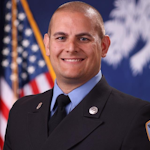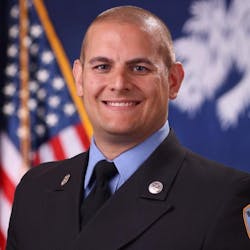When a fire has consumed all available oxygen, it only takes one open door or window to create a deadly backdraft and subsequent explosion. Like a backdraft, our minds quickly can starve for the care and well-being that’s needed to be productive and happy. The mind can be a tricky enemy when mental health isn’t addressed. We can have a mental explosion with just one minor trigger.
I’ve been in the first responder environment since 2001. I started my career at the age of 18 as a paid-on-call firefighter in my hometown in Illinois. Before that, I had no primary ambition. I just graduated high school and had no clue what I wanted to do. I always talked about being a firefighter and, because of an accident-prone childhood, even saw firsthand what firefighters do. I knew I wanted to do this job, because, as an inspired young adult, I wanted to help people. Little did I know that helping people meant that I would see some of the worst things that a person could see. Honestly, no one can be prepared for that.
I hope to share how I’ve learned ways to cope with job-related stress, anxiety and mental overload.
The build-up
Early in my career, I wish that I had some mental health guidance. As an 18-year-old, I was unprepared to see and process traumatic patients/situations.
One of my first traumatic calls involved an older woman who was the victim of a hit-and-run accident. Arriving on scene was a shock in and of itself, but then, I had to transport my first deceased patient.
As a newer firefighter, I wasn't prepared to experience these things. I played high school sports and went to school dances just a year before. It was a shock to my system to see an older woman who just came out of church lying in the middle of the road. Brain matter was on the pavement. Her life was gone in the blink of an eye, and my life was changed.
In 2001, there were no programs to work through traumatic experiences such as this. I’ve gone my whole career stuffing things away, never addressing issues that arose. Unfortunately, I’ve noticed there is a stigma in this field. Talking about feelings and how experiencing these traumatic calls affects our life is viewed as a weakness. After all, “we are brave firefighters who run into burning buildings for a living.” We shouldn’t be affected by this kind of stuff. However, we all have a breaking point, and some of us can even take on more than most when it comes to mental bandwidth. The key to this is figuring out how much that you can hold and how you will empty that mental bandwidth hard drive.
The great escape
As a member of my department's wellness committee, which focuses on the mental well-being of new firefighters and grizzly old vets, I’ve researched many different avenues for mental health treatment and prevention. It’s interesting, because there is no good way to prevent mental health issues, because everybody reacts differently to similar experiences.
The good news is that there are many ways to address mental health issues in the fire service, so we don’t keep adding to our already overloaded bandwidth.
The Center for Firefighter Behavioral Health has been researching mental health and ways to address the wellness of every firefighter that it can reach.
The Everyone Goes Home program addresses mental healthcare in the fire service. Among the program’s 16 Firefighter Life Safety Initiatives, I find it interesting that the number one initiative is Cultural Change. It’s about time that we see cultural change as a top priority in a business that has been a “bury it deep down” type of organization for as far back as anyone can remember. That’s an exciting development that hopefully will change the way that the fire service views mental health and the effect that this field has on it.
With the help of a FEMA grant, Dr. Sara Jahnke performed a study in the Missouri Valley by surveying 656 firefighters from 24 different departments. She found that 85 percent of career firefighters reported drinking in the past 30 days; half of them reported binge drinking in those 30 days. To break that down even further, firefighters typically work 8–10 days per month, and the ones who were surveyed reported drinking 10 days out of that month. That frequency may not seem like a lot, but it is significantly higher compared with the general population (62 percent reported drinking in the past 30 days).
When firefighters use alcohol as a coping mechanism, the mental health issue becomes more prominent. I’m just as guilty of this as the next person and often used drinking alcohol to diminish the stress.
A study in 2019 revealed that police and fire personnel were more likely to die by suicide than in the line of duty. EMS personnel were 1.39 times more likely to commit suicide than the general public. These numbers are staggering considering that, in 2019, 1.4 million people attempted suicide and an estimated 475,500 people succeeded.
A few years back, I found out that an old fire chief who I worked with, and someone my family knew closely, took his own life. He always appeared happy. No one ever expected that news.
Suicide in the EMS field is a problem that needs immediate attention. It won’t fix itself when people live in silence because they are afraid to be ridiculed or, worse yet, penalized in their career.
The comeback
You might now ask, “How do I get the help that I need?” There are tools out there, such as Employee Assistance Programs (EAPs) and mental health coaches. However, they only help when they are utilized.
The next question to ask is, “Am I ready to admit that I need help and to reach out for it?”
Allow me to take a moment to speak to the firefighters who still might be saying “Suck it up” to people who need to talk about a traumatic call. Please take off the mask that you have been wearing and take a long, hard look in the mirror. What traumatic experiences have you stuffed down that still affect you today? What pain are you trying to drown out? There is strength in our weaknesses if we admit that we can’t go this road alone.
I’ve been fortunate enough to be a part of a fire department in a state that’s very proactive in mental health and that makes sure that firefighters receive the help that they need. My department has several options, including an EAP program, and, through the region and state level, we have firefighter assistance teams that are ready to help at any time.
A great resource is the organization Pocket Peer. Here, firefighters and chiefs open up about their experiences and are completely transparent on issues that they dealt with and how they overcame these obstacles to become a better version of themselves.
I don’t claim to have all of the answers, but I recognize my weaknesses and shortfalls, which allows me to start opening doors towards healing. I never will forget the calls that I went on and the memories of things that I can't unsee. Once we learn to organize these thoughts, meet them head-on as they happen, and then file them away, we honestly can eliminate that bandwidth overload and hopefully prevent a mental backdraft. I read way too many stories of firefighters who took their own life because they couldn’t fight these demons. In my honest opinion, if we say that we’re a family and that we have each other’s back, then why would we not be willing to drop everything and help our family members out?
I'll leave you with a quote that made me think deeply about my own experiences. I hope that it encourages people who are struggling and inspire you to reach out and get the help that you need when you need it.
“Emotional pain is not something that should be hidden away and never spoken about. There is truth in your pain, there is growth in your pain, but only if it’s first brought out into the open.” — Steven Aitchison

Eric Ligeikis
Eric Ligeikis is a 21-year firefighter from Bluffton, SC, who leads his department’s mental health program.






